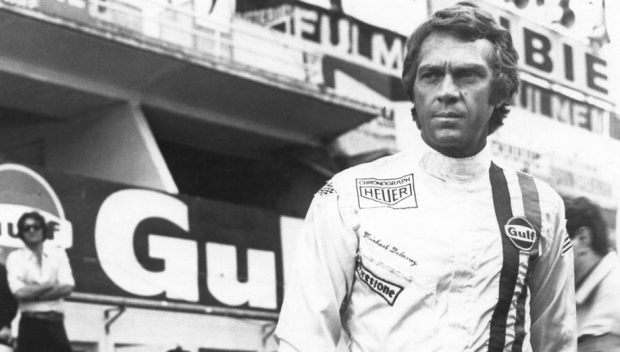
 Starting out from a farm in Missouri, Steve McQueen rose through the ranks of Hollywood to become the King of Cool. Hugely popular flicks like The Great Escape, The Magnificent Seven, Bullitt, and The Thomas Crown Affair served to make McQueen an icon and allot him a personal freedom and power within the industry. He was an uncompromising, ambitious zealot for speed. For auto-racing he had a passion and he sought with the film Le Mans to make the ultimate racing picture, a film that would put the audience in the car and show things from the driver’s perspective.
Starting out from a farm in Missouri, Steve McQueen rose through the ranks of Hollywood to become the King of Cool. Hugely popular flicks like The Great Escape, The Magnificent Seven, Bullitt, and The Thomas Crown Affair served to make McQueen an icon and allot him a personal freedom and power within the industry. He was an uncompromising, ambitious zealot for speed. For auto-racing he had a passion and he sought with the film Le Mans to make the ultimate racing picture, a film that would put the audience in the car and show things from the driver’s perspective.
What happened instead was a production full of crashes both literally and metaphorically. McQueen worked as both star and producer of Le Mans, based on the annual twenty-four hour car race that takes place in France. As the producer, McQueen made most of the major on-site decisions during the production of the film. His relentless pursuit of realism could be compared, in some respects, to that of Werner Herzog, but there was one glaring problem: McQueen was speeding ahead with no real idea where the vehicle was going. It was not uncommon in those days to start a production with an unfinished script, but at six weeks into shooting there was still nothing, and they were $1.5 million over budget. McQueen nixed every story idea that came along and, by and by, he would fall out with Alan Trustman, who had helped catapult McQueen into the stratosphere by writing Bullitt and The Thomas Crown Affair. Trustman would never write another screenplay after this fiasco. The only story element that the King of Cool had in place at this point was that he desired his character to lose in the end.
There is something very telling in this desire and it is revealing of the dual persona of the silver screen idol that emerges in the documentary film Steve McQueen: The Man & Le Mans. On one side of the coin we are presented with a burgeoning megalomaniac who wants to build an empire; a man who shushes up a car crash to hide one of his uncountable episodes of philandering; a man who sought total control over an utterly directionless project that would alienate completely (to say nothing of his wife) both Trustman and John Sturges, who had directed The Great Escape and The Magnificent Seven and who would walk away from directing the disastrous Le Mans; and a man whose ceaseless drive for perfection coupled with a complete lack of direction arguably cost David Piper, one of the actual drivers working on the film, his leg and nearly his life.
But there is another side of McQueen that runs parallel to this, a side that seems to be striving to restore some lost sense of humanity through the inarticulated narrative of the film that he is trying to make; and ultimately, his Icarus-like fall, through which he loses so much in real life, is quietly revelatory. The Man & Le Mans tells this tale through engaging and compelling interviews with filmmakers, family and drivers, as well as with lots of found footage from the time of the production that is strung together with a virile grace reminiscent to a degree of James Dickey’s poetry.